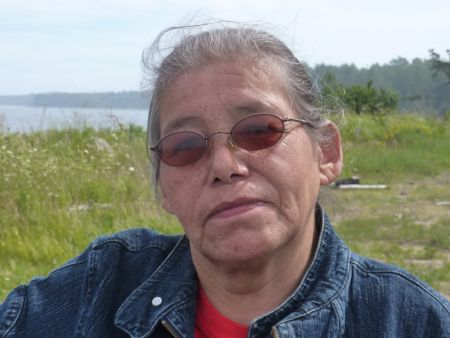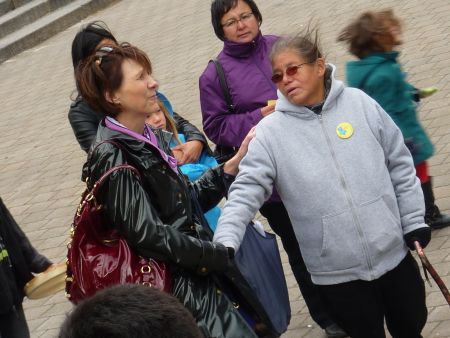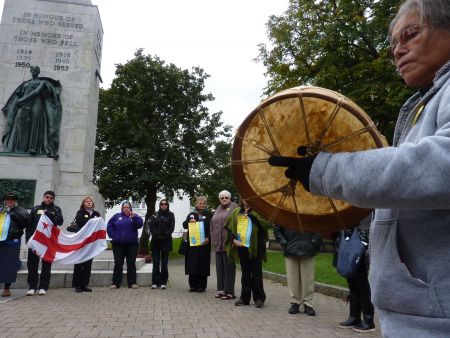HALIFAX—A federal court ruling last month might have relieved Maurina Beadle of Pictou Landing of her worries. She and her band council have been struggling to keep her 18-year-old son Jeremy Meawasige—born with multiple disabilities—at home with her. But the court victory, which mandated the Government of Canada to fund the teen's home care, is now being appealed by the Crown.
“I’m not surprised, not one bit,” said the First Nations mother shortly after the appeal was announced on May 5. “They say one thing and mean another. That’s why I didn’t let my guard down. I didn’t celebrate too much.”
The court victory had been difficult for the First Nations mother to celebrate wholeheartedly in the first place. In an interview with The Dominion a few days after the ruling was announced, Beadle said that health care funding for her son should have come through long ago.
“But it doesn't work that way, does it?" she said.
In an effort to obtain those funds, Beadle and the Pictou Landing Band Council (PLBC) filed an application against the Canadian government in June 2011, stating that Jeremy was entitled to the same health care that would be provided to an off-reserve Nova Scotian child in the same situation. Specifically, they were looking for funding to keep Jeremy at home with his mother, who had been his sole care provider until a double stroke in May 2010 left her physically unable to perform the tasks required for Jeremy's care.
In a precedent-setting ruling on April 4, 2013, Justice Leonard S. Mandamin of the Federal Court of Canada ruled in favour of Beadle and the PLBC, ordering Aboriginal Affairs and Northern Development Canada (AANDC) and Health Canada to reimburse the band council beyond the loosely defined $2,200 respite cap in Nova Scotia. However, the ruling does not specify the reimbursement amount. Paul Champ, the lawyer representing Beadle and the band council, said the ruling likely means they can expect a full reimbursement for all the home care services they have paid for themselves and legal fees.
"This is of course a great victory for the family," said Champ of Mandamin’s ruling. It’s a victory that removes the threat that the band's money could run out at any time, which would force Jeremy into an institution outside his community, he said. "For the band, it's vindication.”
Before the recent ruling, the band took a courageous stand to provide Jeremy with the care he needs, said Champ, even though those expenses took up 80 per cent of the band's designated budget for such services.
The federal government's recent appeal of the court ruling means the case will move to a higher court, where any decision will set a higher precedent. “And the facts are bad for government, and good for the family and the band," said Champ.
In arguing their case, Beadle and the PLBC invoked the Canadian Charter and—for the first time in a Canadian court—Jordan's Principle.
Jordan's Principle is a child-first policy designed to address the elusive jurisdictional and legal frameworks governing social services for a specific demographic: First Nations children with multiple disabilities. Providing these vulnerable citizens with health services at the provincial standard, which is the responsibility of AANDC and Health Canada, is complicated by their Aboriginal status. Applicants must not only convince provincial bodies—which normally do not operate on-reserve—to perform an assessment, but also convince the federal bodies to meet the directives of the provincial assessment, and then pay for the costly services. Coordinating this process is complicated and lengthy for families already exhausted by the high levels of care their children require, and it often ends with the children receiving long-term institutional care.
Jordan's Principle is named after Jordan River Anderson, a Norway House Cree child from Manitoba who was born with a rare neuromuscular disorder. He was hospitalized for more than two years while provincial and federal departments fought over which was responsible for funding his home care. Jordan died at the age of five without having ever gone home. Recognizing the tragedy of his case, the House of Commons unanimously passed Jordan's Principle in 2007.
The policy has never been successfully invoked.
However, Mandamin's ruling stated that Jeremy’s case "engages consideration under Jordan's Principle," setting a precedent for dozens of cases like Jeremy's across Canada.
"This decision gives legal force to Jordan's Principle so child advocates, families and organizations can hold governments legally accountable when they fail to ensure First Nations children can access government services on the same terms as other children," wrote Cindy Blackstock, executive director of the First Nations Child and Family Caring Society of Canada, in an email to The Dominion.
In Manitoba alone, more than 50 cases of First Nations children are seeking funding through Jordan's Principle. They will now have the legal clout to demand public services, according to Philippa Pictou, Health Director for Pictou Landing First Nation, who first suggested applying Jordan's Principle to Jeremy's case. Pictou recently returned from Winnipeg, where she was guest speaker at a Manitoba chiefs' conference on Jordan's Principle. In 2011, a tripartite agreement on implementing Jordan's Principle was reached in New Brunswick and a bilateral agreement was reached in British Columbia. Similar efforts continue in other provinces.
The federal government has been able to avoid adhering to its policy and funding care for Jordan's Principle applicants by simply denying, in every instance, that a jurisdictional dispute between federal and provincial governments exists. Without a jurisdictional dispute, the policy does not apply. In Jeremy Meawasige’s case, Aboriginal Affairs officer and federal point person on Jordan’s Principle Barbara Robinson concluded that the principle didn’t apply because both the federal and provincial governments agreed on, and did not dispute, the $2,200 monthly amount to be provided for Jeremy’s care. Justice Mandamin disagreed.
"The Nova Scotia Court held [that] an off-reserve person with multiple handicaps is entitled to receive home care services according to his needs," reads Justice Mandamin's ruling, which cites a case in which a 34-year-old non–First Nations Nova Scotian successfully sued for in-home care above the provincial norm. "His needs were exceptional and the SAA [Social Assistance Act] and its Regulations provide for exceptional cases. Yet a severely handicapped teenager on a First Nation reserve is not eligible, under express policy, to be considered despite being in similar dire straits."
Mandamin went on to point out that if both levels of government are wrong about what services ought to be provided to a First Nations person, they cannot then deny the correct services by claiming they agree in order to avoid a jurisdictional dispute.
The judge concluded that Robinson, despite her "specialized expertise in this matter," was "unreasonable" in her conclusion that Jeremy's case did not meet the criteria for a Jordan's Principle case.
The successful avoidance of any "jurisdictional dispute" has also meant that an $11 million fund set aside in the 2008 federal budget for Jordan's Principle cases was never touched before it was dissolved in the 2012 federal budget by the Harper government, according to a briefing package for the Ministry of Health dated April 23, 2012, obtained by Cindy Blackstock through a Freedom of Information request.
"This surprises me," wrote Blackstock, "because everywhere I go, people are able to readily identify cases where children are being denied or delayed receipt of services because of federal-provincial disputes on payment."
Throughout Jeremy’s court case and even in the wake of the court victory, Maurina Beadle has maintained that, for her, the process has never been about money, or winning, but rather about fighting government greed and neglect of human rights, and leading the life she and her son deserve.
"I had to drop a lot of things to look after Jeremy," she said, citing the legal battle to close the Northern Pulp Mill in nearby Pictou that has used her community as a dump for its toxic effluent for the past 50 years. "I had no time, no social life.... I was spending so much time in the hospital, because Jeremy was my number one priority. But I'm going to pick up where I left off—that damn pulp mill has to go. It's a long battle but someday it's going to have to close."
First, though, Beadle has to face another round in court with the federal government.
“This is nothing new to me,” she said of the Crown’s appeal. “If they want to play that game, I’ll play. I’m not one bit afraid. We won the first round. It’s all out in the open that the government doesn’t want to be doing what they’re supposed to be doing. I’ll stay on every step of the way."
With files from Philippa Pictou and Cindy Blackstock.
Moira Peters lives and bikes in Halifax.





